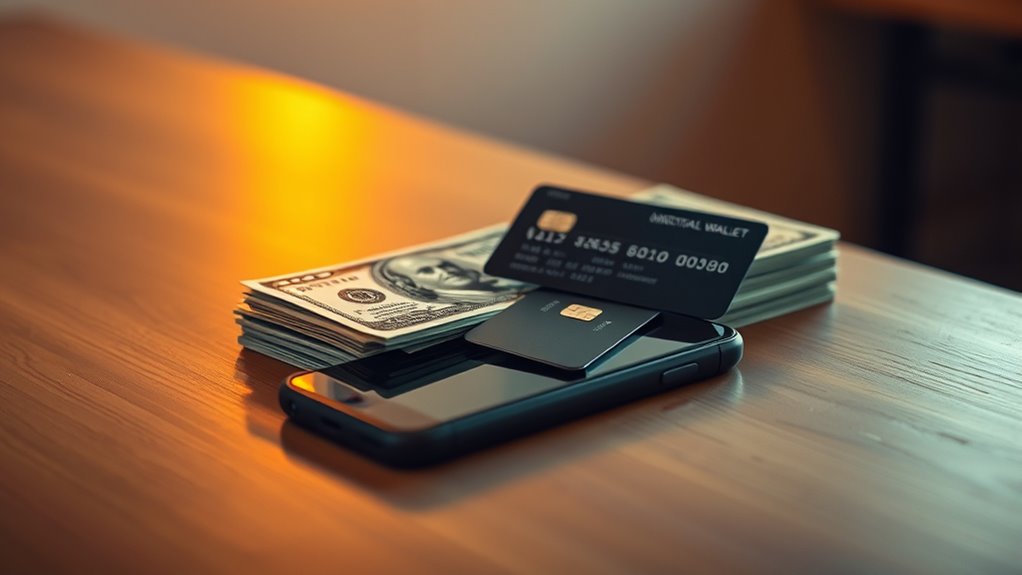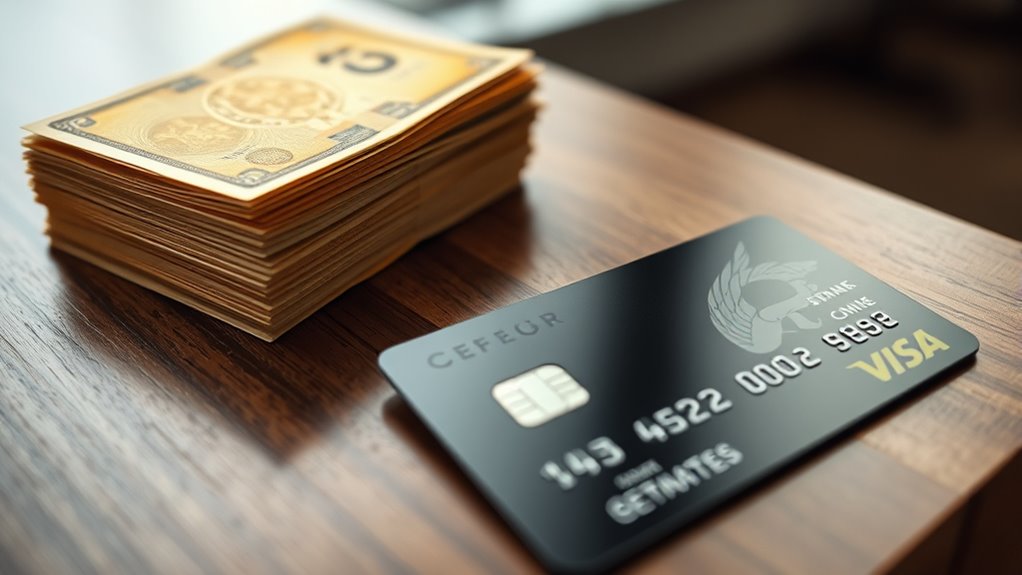Choose cash when you want to stay within a budget, keep things simple, or avoid digital fraud. Use credit for bigger purchases, earning rewards, or building your credit score. Cards provide added security and convenience, especially online or for quick transactions, but carry the risk of overspending if you’re not careful. Understanding when each suits your goals can help you make smarter money choices—stick around to discover more ways to optimize your payments.
Key Takeaways
- Use cash for small, in-person transactions or when avoiding digital tracking and fees.
- Opt for credit cards for larger purchases to earn rewards, build credit, and access fraud protections.
- Choose debit cards for everyday spending when you want to stay within a budget and deduct directly from your account.
- Use cash if you prioritize privacy or are in regions with limited card acceptance.
- Rely on credit for big, online, or high-value purchases where security and purchase protection are essential.

Have you ever wondered whether cash or credit is the better payment method? The answer depends on your habits, preferences, and financial goals. In 2024, the average American makes about 48 payments a month, with cash accounting for roughly seven of those. While cash usage has declined slightly—from 87% in 2023 to 83% in 2024—it still plays a role, especially for smaller or in-person transactions. Nearly two-thirds of cash payments were made by consumers who prefer other methods like debit or credit cards. Younger adults, especially those aged 18 to 24, tend to lean towards mobile payments for nearly half of their transactions, signaling a shift away from cash and toward digital solutions. But for many, cash remains a familiar, trusted option, particularly among older generations and lower-income households earning under $25,000 annually, who rely more heavily on cash for everyday expenses.
In 2024, Americans favor digital payments, but cash remains vital for underserved groups and in-person transactions.
When it comes to choosing between cash and credit, consider your financial control. Debit cards are popular among consumers focused on budgeting, as they help avoid debt by deducting directly from your account. On the other hand, credit cards are favored for their rewards, credit-building potential, and the ability to make high-value purchases. However, they carry an average interest rate of around 21.3% in 2025, so carrying a balance can get expensive. Many people use credit cards strategically—spending more during holiday seasons or summer sales—but are increasingly cautious about debt, especially since total credit card debt has surpassed $1.2 trillion. Some shift their everyday spending to debit or mobile payments to stay disciplined—a trend driven by the increasing popularity of digital payments—reserving credit cards for benefits like rewards or building credit. This shift reflects the broader adoption of digital payment solutions, which are reshaping how consumers manage their finances.
Security is another key factor. Debit cards have seen an 18% reduction in fraud over five years, making them a safer choice for many. Credit cards also offer protections against fraud, but the risk remains a concern. Cash, meanwhile, offers complete anonymity and zero risk of digital fraud, making it appealing if privacy is a priority. Digital payment methods, like mobile wallets, combine convenience with layered security, blending features of both credit and debit cards. Understanding these security differences can help you choose the most appropriate method based on your comfort level with online threats.
Acceptance by merchants favors credit and debit cards, which are widely accepted across stores and online platforms. They offer quick, seamless transactions, especially for larger purchases. Cash, while still accepted, is increasingly less convenient in a digital world. Ultimately, choosing between cash and credit depends on what matters most to you—whether it’s control, security, convenience, or rewards. Knowing when to use each can help you manage your finances better, avoiding unnecessary debt while enjoying the benefits of modern payment options.
Frequently Asked Questions
How Can I Improve My Credit Score Quickly?
To improve your credit score quickly, pay your bills on time consistently, and keep your credit utilization low—ideally under 30%. Avoid opening too many new accounts at once, and check your credit report for errors. Paying down existing debt and keeping old accounts open can boost your score. Consider requesting a credit limit increase to lower your utilization ratio, and stay disciplined with your financial habits.
Are There Situations Where Cash Is More Secure Than Credit?
Yes, there are times when cash is more secure than credit. When you’re dealing with small, local transactions or tips, cash reduces the risk of identity theft and fraud. Cash also helps you stick to a budget since you physically see your spending. In emergencies or when traveling to unfamiliar places, carrying cash can be safer if card systems are unavailable or compromised.
What Are the Hidden Fees Associated With Credit Card Use?
Did you know that in 2022, Americans paid over $15 billion in credit card late fees? Hidden fees include annual charges, foreign transaction fees, cash advance fees, and balance transfer fees. These costs can sneak up on you if you’re not careful. Always read your card’s terms, monitor your spending, and avoid unnecessary transactions to keep those hidden fees from eating into your budget.
Can Using Cash Help Manage My Budget Better?
Yes, using cash can help you manage your budget better. When you pay with cash, you physically see how much money you’re spending, making it easier to stick to your limits. It prevents overspending since you can’t spend more than what you carry. Plus, it encourages mindful spending and reduces impulse buys, giving you better control over your finances and helping you stay on track with your budget goals.
How Do International Transactions Differ Between Cash and Credit?
International transactions with cash involve exchanging your money for local currency, which can be straightforward but risky due to theft or misplacement. Credit cards, however, often offer better exchange rates, fraud protection, and convenience. You might pay foreign transaction fees, but they usually provide better security and record-keeping. When traveling abroad, using credit cards for transactions is generally safer and more efficient, while cash is useful for small purchases or in places that don’t accept cards.
Conclusion
Think of cash as your trusty old lantern, illuminating small, tangible purchases with warmth and simplicity. Credit, on the other hand, is a mighty river, flowing fast and wide, perfect for bigger journeys where convenience and flexibility matter. Knowing when to wield each is like mastering a dance—step lightly with cash for everyday twirls, but embrace credit when you need to glide smoothly through larger, more complex moves. Master this rhythm, and your financial dance will always stay in step.









